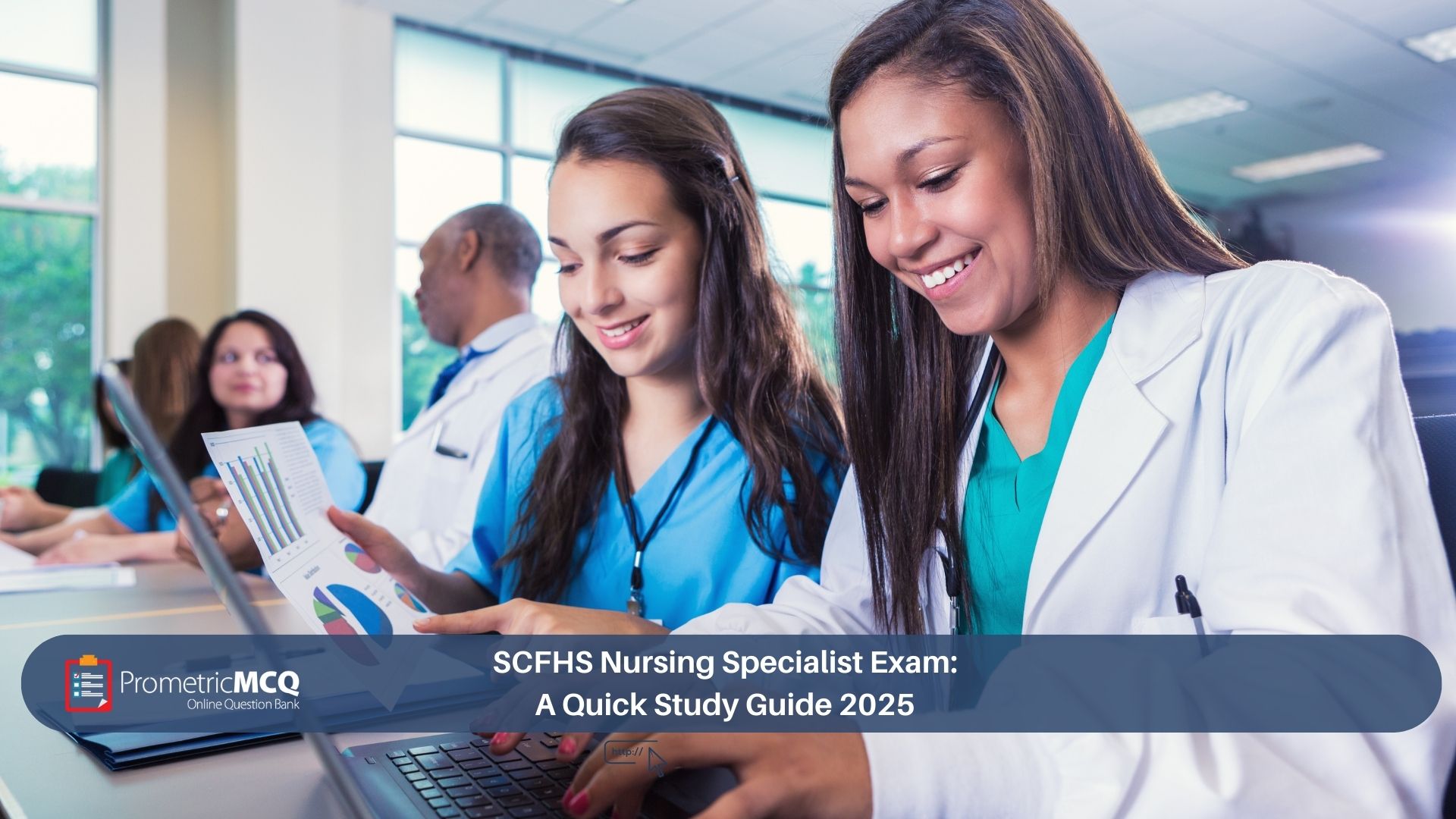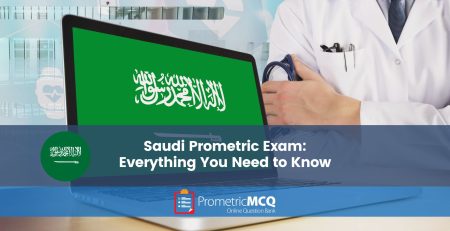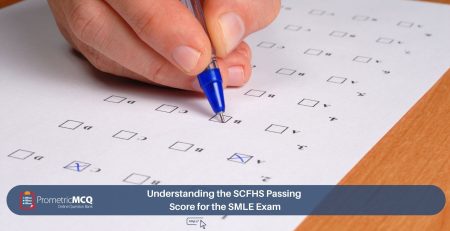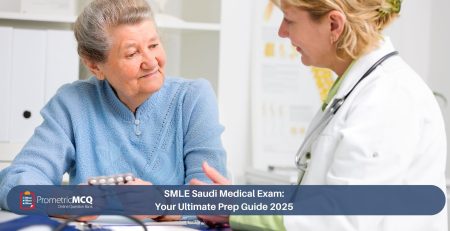
SCFHS Nursing Specialist Exam: A Quick Study Guide 2025
fatima@prometricmcq.com2025-09-17T21:30:27+00:00Table of Contents
ToggleSCFHS Nursing Specialist Exam: A Quick Study Guide 2025
For experienced nurses seeking to advance their careers, the Kingdom of Saudi Arabia offers a landscape rich with opportunity in specialized fields like critical care, oncology, and cardiac nursing. The Saudi Commission for Health Specialties (SCFHS) recognizes this advanced level of practice through the Nursing Specialist Exam, a rigorous assessment that validates a higher level of clinical judgment, leadership, and expertise. This exam is the gateway to securing a “Specialist” classification and unlocking senior roles within the Kingdom’s most advanced healthcare facilities.
While the prospect of a specialist-level exam can seem intimidating, a focused, strategic approach can make all the difference. This isn’t about re-learning your entire nursing degree; it’s about elevating your existing knowledge and mastering the application of complex principles in high-stakes scenarios. This “quick” study guide is designed to be your intensive roadmap to success. It cuts through the noise to focus on what truly matters: high-yield topics, critical thinking skills, and an efficient study plan tailored for busy, experienced nurses.
In this ultimate 2025 guide, we will deconstruct the Nursing Specialist exam pattern, provide a granular analysis of the high-yield syllabus domains, and lay out an intensive preparation strategy. We will also address your most pressing questions in a comprehensive 10-point FAQ section, giving you the clarity and confidence needed to pass on your first attempt and achieve your professional goals in Saudi Arabia.
Key Takeaways for the Nursing Specialist Exam
- Think Beyond the Basics: This exam assumes you’ve mastered fundamental nursing. It will test your ability to manage complex, multi-system patient problems and critically ill patients.
- Clinical Judgment is Everything: Expect complex case scenarios that require you to interpret subtle cues, analyze conflicting data, and make high-stakes decisions.
- Master Advanced Pharmacology: You must have in-depth knowledge of high-alert medications, including vasopressors, antiarrhythmics, anticoagulants, and chemotherapy agents.
- Leadership and Delegation are Key: Questions will test your ability to lead a nursing team, delegate appropriately to other RNs, and manage unit-level quality and safety issues.
- Prioritization on a Higher Level: You won’t just be prioritizing tasks; you’ll be prioritizing the care of multiple critically ill patients, deciding who needs immediate intervention to prevent clinical deterioration.
Deconstructing the 2025 SCFHS Nursing Specialist Exam Pattern
The exam for a Nursing Specialist follows the same trusted format as other SCFHS Prometric exams but with a significant step-up in the complexity and critical thinking required.
- Format: A Computer-Based Test (CBT) consisting of 150 Multiple-Choice Questions (MCQs).
- Duration: 3 hours (180 minutes), giving you an average of 1 minute and 12 seconds per question.
- Cognitive Level: The questions are primarily at the “application” and “analysis” level of Bloom’s Taxonomy. They require you to apply your knowledge to solve complex clinical problems, not just recall isolated facts.
- Scoring: The exam is scored on a scale of 800, with a passing score of 500 (~62.5%). However, due to scaled scoring, the best strategy is to aim for 70-75% on practice tests. This is a crucial part of how to pass the Saudi SCFHS exam.
A Deep Dive into the Nursing Specialist Syllabus for 2025
The syllabus for the specialist exam builds upon the foundation of general nursing, expecting a deeper understanding of pathophysiology and evidence-based practice. A successful study plan must concentrate on these advanced domains.
| Core Specialist Domain | High-Yield Topics and Key Concepts |
|---|---|
| Domain 1: Advanced Pathophysiology & Health Assessment | This domain tests your understanding of the “why” behind complex diseases. Key areas: – Hemodynamic Monitoring: Interpretation of CVP, arterial lines, and basic Swan-Ganz (PA catheter) readings. – EKG Interpretation: Moving beyond basic rhythms to identify life-threatening arrhythmias (e.g., V-Tach, Torsades de Pointes), bundle branch blocks, and signs of ischemia/infarction (ST elevation/depression). – Complex Lab Analysis: Interpreting ABGs with compensation, coagulation panels (PT/INR, aPTT), and cardiac enzymes in the context of a clinical picture. – Multi-System Assessment: Assessing critically ill patients with conditions like sepsis, shock, and Acute Respiratory Distress Syndrome (ARDS). |
| Domain 2: Management of Complex Health Alterations | This is the largest and most challenging domain, focusing on high-acuity patient care. Key areas: – Critical Care Concepts: Management of ventilated patients (understanding modes, alarms, preventing VAP), management of shock states (septic, cardiogenic, neurogenic), and care of the patient with increased intracranial pressure (ICP). – Advanced Medical-Surgical: Care of complex post-operative patients (e.g., post-CABG, post-neurosurgery), oncology nursing (managing chemotherapy side effects, oncologic emergencies), and care of patients with multi-organ dysfunction syndrome. – Acute Management: Rapid response protocols, initial management of trauma, and care of the patient receiving massive transfusions. |
| Domain 3: Advanced Pharmacology | This domain requires a deep understanding of high-alert and critical care medications. Key areas: – Vasoactive Drips: Knowing the indications and effects of vasopressors (e.g., norepinephrine, dopamine) and vasodilators (e.g., nitroglycerin, nitroprusside). – Antiarrhythmics: Understanding the use of drugs like amiodarone, lidocaine, and adenosine. – Advanced Anticoagulation: Management of heparin infusions, warfarin therapy (bridging), and newer oral anticoagulants. – Titration Skills: Many questions will be scenario-based, requiring you to determine if a titrated drip should be increased, decreased, or stopped based on patient parameters. |
| Domain 4: Leadership, Quality & Patient Safety | This domain tests your ability to function as a leader and advocate within the healthcare team. Key areas: – Clinical Decision Making: Using evidence-based practice guidelines to inform care. – Delegation & Supervision: Appropriately delegating tasks to Nurse Technicians (Generalist RNs) and other staff, and providing oversight. – Quality Improvement: Understanding principles of root cause analysis, sentinel events, and quality improvement projects. – Ethical & Legal Issues: Navigating complex ethical dilemmas, end-of-life care, and advanced directives. |
Frequently Asked Questions (FAQs) for the SCFHS Nursing Specialist Exam
The Nursing Technician exam focuses on the competencies of a safe, general registered nurse. The Nursing Specialist exam assumes that baseline competence and tests for a higher level of practice. It includes more questions on critical care, management of complex patients, hemodynamic monitoring, advanced pharmacology, and leadership/delegation to other nursing staff.
The exam is a generalist-specialist test. It is not specific to one sub-specialty like pediatrics or midwifery (which have their own exams). It is designed for nurses with experience in high-acuity areas like Critical Care (ICU), Emergency, Cardiac Care, or advanced Medical-Surgical units. The content is most reflective of an ICU/Critical Care nurse’s knowledge base.
The exam is scored on a scale up to 800, with the official passing score set at 500. This is approximately 62.5%. However, due to a process called scaled scoring, it’s not a raw percentage. Your safest bet is to aim for a consistent score of 70-75% in high-quality practice exams to ensure you pass comfortably.
Eligibility typically requires a Bachelor of Science in Nursing (BSN) and a minimum number of years of clinical experience in a relevant specialty area (usually 2-3 years, but this can vary). You may also need a Master’s degree for certain higher classifications. Always check the latest requirements on the SCFHS’s Mumaris Plus portal before applying.
EKG interpretation is a high-yield topic. You should be able to instantly recognize and state the priority intervention for life-threatening rhythms like Ventricular Tachycardia, Ventricular Fibrillation, Asystole, and complete heart block. You should also be able to identify signs of myocardial ischemia and infarction.
For a specialist-level exam, a high-quality, advanced question bank (QBank) is indispensable. While review books are good for content, the QBank is where you will develop the critical thinking and clinical judgment skills needed to pass. Look for a resource that provides complex, multi-step questions with detailed rationales. Our guide on Saudi Prometric exam study materials can help you choose.
Yes. As a specialist, you are expected to be a clinical leader. Expect questions on prioritizing multiple unstable patients, delegating tasks to a junior RN, handling conflict with a physician, and identifying breaks in patient safety protocols. These questions differentiate the specialist from the generalist.
The process is the same as for all healthcare professionals. The DataFlow Group will conduct Primary Source Verification (PSV) of your nursing degree, license, and, crucially, your experience letters to confirm you meet the requirements for the “Specialist” classification. A positive DataFlow report is mandatory before your SCFHS license can be issued.
The exam is based on international, evidence-based best practices. Guidelines from globally recognized bodies like the American Heart Association (for ACLS/BLS) or the World Health Organization’s Patient Safety initiatives are the standard. The exam does not test on local hospital policies but on universal principles of safe, high-quality nursing care.
It is vital to use a resource that provides questions at the correct cognitive level. Standard RN-level questions will not adequately prepare you. You need a QBank that is specifically designed for advanced practice or critical care review. A dedicated resource like the SCFHS Nursing Exam MCQs platform offers questions that test at this higher, specialist level.
Conclusion: Elevating Your Practice for the Kingdom
The SCFHS Nursing Specialist Exam is more than just a test; it is an affirmation of your expertise and your readiness to take on a leadership role in one of the world’s most dynamic healthcare systems. A “quick” but intense and focused preparation period is the key to success. By concentrating on high-yield, complex topics and making rigorous MCQ practice the core of your study, you can efficiently bridge the gap between your current experience and the specialist-level competence required by the SCFHS. Embrace this challenge, prepare strategically, and you will be well on your way to achieving your career goals in Saudi Arabia.
Ready to Prove Your Specialist Expertise?
Our premium SCFHS Nursing QBank features complex clinical scenarios, advanced pharmacology questions, and leadership challenges designed to push your clinical judgment to the specialist level. It's the ultimate tool to ensure you pass with confidence.










